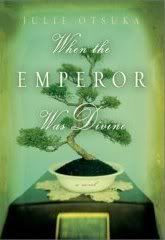

I finished my first two books for the challenge: Strangers by Taichi Yamada and When the Emperor was Divine by Julie Otsuka.
I don't think I could have loved When the Emperor was Divine any more. It tells the story of a nameless Japanese-American family that is sent to an internment camp during World War II, and it's a sad, subtle and very moving book. The writing is absolutely perfect. Julie Otsuka managed to convey powerful emotions while remaining gentle and restrained. You can read my full review here.
I have somewhat mixed feelings about Strangers. A ghost story set in modern Tokyo, Strangers is very haunting and atmospheric. I loved it until the last few chapters, but I was somewhat taken aback by the twist at the end. My review can be found here.
I LOVED When THe Emporer Was Divine. One of my book clubs read it two years ago, and I'll never forget it. (I can still see the mother having to kill the dog before they left. So sad, not the most sad by any means, but so piercing.) I never really knew much about internment camps until I'd read this book. I love books that bring people's courage to the forefront because we all must face adversity, and those kinds of books teach me how to walk through it a bit better.
ReplyDeleteYour second novel is new to me. Thanks for writing them, Nymeth!
More books to add to my reading list! ;0)
ReplyDeleteBellezza: I know, the scene with the dog was absolutely heartbreaking. I didn't know much about internment camps either until I read Obasan last year, and now this. And you're right, the courage of these characters is inspiring.
ReplyDeleteThe Holistic Knitter: I hope you enjoy them!
Look at you, already 2 books down! That's great. I want to read both of the books you reviewed.
ReplyDeleteI "read" When the Emperor Was Divine as an audio book during my move from Southern California to Northern California several weeks ago. I was struck by how few people were actually named throughout the book (the protagonists were never named). It is, I think, the author's way of saying, "There were so many Japanese-American families affected by the relocation during World War II that it would be hard to single out just one to tell their story, so here is their collective story--you, the reader, may supply the names."
ReplyDeleteA poignant story in which there are no superfluous words.
It's lack of superfluous words are one of the things I enjoyed the most. It just cuts to the quick.
ReplyDelete